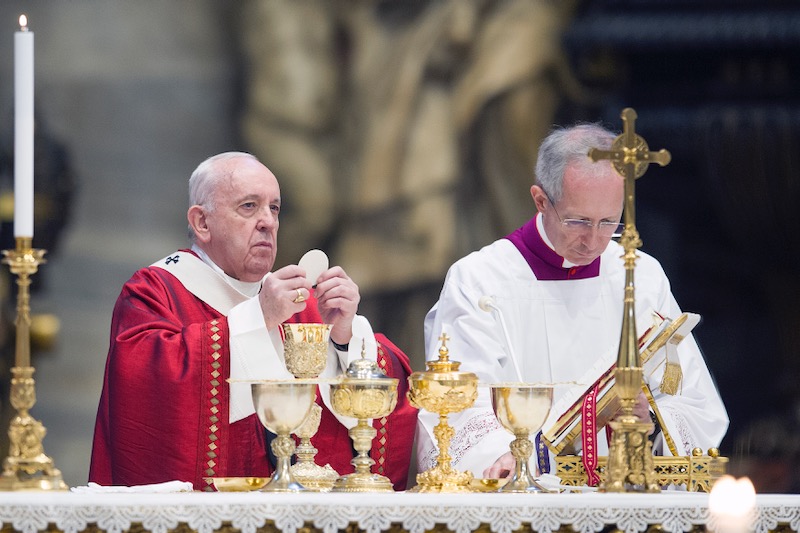
Pope Francis celebrates Mass in St Peter's Basilica on the Vatican.IPA/IPA MilestoneMedia/PA photos
simply two words – however they say everything in regards to the course of the reforms of the Francis period.
The phrases are contained in the new Italian translation of the Mass texts, accredited by way of Pope Francis, and should be used from Easter Sunday 2021.
within the prayers spoke of over the bread and wine, the priest says – as he always has – that Jesus' blood changed into poured out per tutti ("for all") and not per molti ("for a lot of").
The Italian bishops have, truly, changed nothing, without difficulty retaining the translation of the Latin phrase seasoned multis that has been favourite given that the liturgical reforms mandated by way of the 1962-65 2d Vatican Council.
however this is what's so colossal. the interpretation of seasoned multis has been the field of extreme debate over fresh a long time.
Following the Council, many nations used the equivalent of "for all" in their translations, despite the fact this began to alternate in 2001, after the Liturgiam Authenticam instruction called for a more literal translation of Latin texts.
In 2006, Rome ruled that professional multis may still be translated as "for a lot of" with Benedict XVI insistent on this aspect.
within the translations of the Roman Missal used in English, Spanish and French-speakme nations, the equal of "for a lot of" is used. Yet despite Rome's insistence, in 2011, the Italian bishops resisted and voted overwhelmingly to retain "for all". And that's how it is within the newly-printed Italian Missals.
on the heart of the talk is a crucial theological query.
"For all" displays the reality that Christ died for everybody, while "for many" reflects the reality that salvation requires the participation of individuals. Matthew 26:28 and Mark 14:24 both confer with Christ's blood being shed "for a lot of".
The consistent theme of the Francis pontificate is that God's mercy is all-embracing, and the Church is a box health facility welcoming all sinners. nobody is excluded. however a less literal translation of the Latin, the phrase "for all" stronger reflects the teaching that Christ's sacrifice became for the complete of humanity, and is per Vatican II.
because the historical Latin motto explains: lex orandi, lex credendi. the rule of thumb of prayer is the rule of belief.
On 28 August, within the Vatican's apostolic library, the Pope turned into presented with a copy of the translation of the Roman Missal into Italian with the aid of a delegation of male and feminine liturgical experts led through Cardinal Gualtiero Bassetti, the president of Italy's bishops' convention.
Bishop Claudio Maniago, who has accountability for liturgy within the Italian hierarchy, mentioned the Pope advised the delegation that liturgical books should exhibit the conciliar reforms.
when you consider that the council, which allowed the use of vernacular languages within the liturgy, bishops the world over were tasked with translating the Latin texts. And through the years, they've been required to replace their translations. beneath the papacies of John Paul II and Benedict, Rome sought to centralise the process.
This brings us to the next massive shift all the way through the Francis hold forth, which is not only concerning the words but the manner the translations are authorised.
In 2017, the Pope gave more advantageous powers to local bishops' conferences over how Latin liturgical texts are to be rendered within the vernacular.
Magnum Principium eliminated the requirement that Rome authorise each factor of translations; instead, its role is to review translations that have been commissioned and permitted through the bishops' convention. Crucially, it aligned the Church more closer with the vision of the second Vatican Council, which had lead the way for local bishops to have more authority. A healthy decentralisation is essential factor of the Pope's reforms.
"extreme centralisation", Francis wrote in his "manifesto" doc, Evangelii Gaudium, "complicates the Church's existence and her missionary outreach." In different words: when it involves the wordings of prayers, it's the bishops on the floor, not curial officers in Rome, who're the surest judges of what goes to most effortlessly support evangelisation.
The Italian missal drama suggests the step-with the aid of-step reforms of the Francis papacy are all about imposing Vatican II, the most significant ecclesial event within the closing 60 years which laid the groundwork stones for the Church of the Third Millennium.
For more on this story, try Christopher Lamb's View from Rome https://www.thetablet.co. uk/view-from-rome



No comments:
Post a Comment